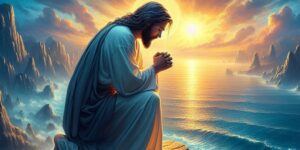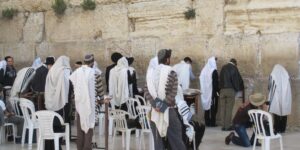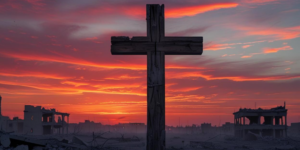Is America’s 4th Great Awakening Around the Corner?
In a nation where liquor stores, marijuana dispensaries and abortion clinics are deemed “essential” by government bureaucrats during the coronavirus outbreak, and church attendance is judged non-essential, we don’t have to study long to diagnose the morbid condition of America’s culture: secular atheism.
The Israelites experienced something similar on the return to Jerusalem from their Babylonian captivity. They were well aware of the fourth of the Ten Commandments in Exodus 20:8 to “remember the Sabbath day, to keep it holy.” However, with godless foreign merchants now controlling Jerusalem and the levers of power, intending to continue to engage in commerce on the Sabbath, this was merely another day of the week for them. And so the way of least resistance for the Israelites was deemed “to accommodate themselves to these foreign customs.”
Much like ancient Israel at the time, America, over the last 100 years, let secularism expropriate its Christian culture and its spiritual, intellectual, educational, economical and vocational levers of influence and power. Christians simply adjudged taking “the path of least resistance” to be “God’s will” and took refuge in a Christian subculture, contrary to Jesus’ ekklesia kingdom assignment in Matthew 16:18.
America’s forefathers took a different path in the 17th to 19th centuries. Refusing to withdraw from the public square and the ministry of civil government, they were unwilling to turn the culture over to those in rebellion against God.
Essentially Christian in outline and character, early American culture harbored a good dose of healthy skepticism toward the secular belief in the fundamental “goodness of man.” Steeped in biblical doctrine, our forefathers fully appreciated the Judeo-Christian consideration of man as deeply flawed, in mind and will; prone to evil; and imperfect in all his ways. In short, man is not to be trusted.
Consequently, their healthy skepticism regarding “the goodness of human nature” led America’s Founders to institute a constitutional system of shared power, known as the “Separation of Powers”: Executive, Judicial and Legislative, as found in the first three articles of the U.S. Constitution.
With some 150 years of biblically based edification and conviction at its core, all seven articles of the U.S. Constitution were drafted in 1787 and ratified in 1788.
No doubt, there were bad apples that soured the barrel. Generally speaking, however, American, biblically based education brought forth men and women of outstanding character. Given the declarations in Proverbs 1:7 and 4:7 of “the fear of the Lord” as the “principal thing” in acquiring knowledge and wisdom, this hardly comes as a surprise. Since early America submitted to scriptural wisdom, assimilating its teachings, they accordingly attained personal, spiritual and moral knowledge that solely can be found in Scripture. As a result, the origin, nature, methods and limits of human knowledge took on a “moral capacity,” embedding it in the warp and woof of culture.
The Hebrew word wisdom (hokmâ’) signifies “masterful understanding,” “skill” and “expertise.” Thus, American exceptionalism was conceived, a Christian culture infused with God’s Word.
Early American education focused on heart and character, a far cry from the sensuous carnality gibberish hoisted by contemporary education theoreticians. Solomon stressed the point by asking in Proverbs 17:16 (ESV): “Why should a fool have money in his hand to buy wisdom when he has no sense?”
The secular and the biblical approach to education stand in stark contrast to each other.
To use the words of Jewish Hebrew scholar Michael V. Fox: “Wisdom belongs to a different category of value and hence cannot be acquired in [secular contemporary education] fashion.”
In an attempt to define America’s wholehearted embrace of secular atheism, we’ll begin with a short quote from Joy Pullmann’s excellent article in The Federalist.
“In the first three-quarters of the United States’ existence, many American schools were directly funded by tax dollars and run by local churches, and sometimes even taught by local ministers (often the most educated person in a town). … So until Supreme Court and legislative changes in the mid-1900s, U.S. public schools were usually overtly Christian: ‘In the 1800s, the country was predominantly Protestant, and public schools taught a generic Protestantism.'”
My own experience as a young student at the Konawa, Oklahoma, grade school is in line with this. Each day started with prayer, followed by the Pledge of Allegiance, Grand Old Flag, God Bless America, Scripture reading and emphasis on the virtues of good character and honesty. Virtues that come packaged with wisdom.
Nonetheless, following 350 years and the spectacular rise of America, the profane Warren Court liberals in 1962-1963 removed: 1) prayer in public school (Engel vs. Vitale) and 2) Bible reading (Abington vs. Schempp), pronouncing them “unconstitutional.” The Warren Court’s decisions redirected America’s energies to a course conflicting with God.
The lone dissenting Justice Potter Stewart in Abington vs. Schempp decried the decision, arguing that it “led not to true neutrality with respect to religion, but to the establishment of a religion of secularism.” The Wall Street Journal agreed, saying that atheism was now “the one belief to which the state’s power will extend its protection.”
Secularism is, of course, no more “neutral” than is Christianity. Both are religious belief systems vying for control of resources and ideological supremacy in America’s public square. Excluding prayer and the Bible from public education is just as much of a religious decision as is including prayer and Bible reading in public education.
The Warren Court’s sleight of hand by presenting their worldview as neutral was simply to whitewash the imposition of their secular, atheistic religion by use of judicial power from 1953 to 1969. There is no neutrality in religion; to believe in God or to not believe in God, both are religious beliefs.
Benjamin Wills Newton (1807-1889) in his 19th-century classic, David the King of Israel, pointed to the spiritual blight that placed ancient Israel in harm’s way: “Saul, the ostensible shepherd of God’s people, found himself unable to confront the danger: no tongue responded to the challenge of the Philistine, no arm was raised on behalf of God’s people, or God’s truth; the energies of Israel seemed paralyzed; their strength gone; their glory departed.”
America’s Christianity may have reached its kairos, a New Testament Greek indication of “the appointed time in the purpose of God.”
Christian under-shepherds and leaders should take the opportunity to lead a mass exodus from the sexularized, heretical inculcation of America’s youth by government-run bureaucrats, facilitated by COVID-19 and the merciful shutdown of all educational institutions.
Chances are good that this will trigger a Fourth Great Awakening in America.
Gideons and Rahabs are cordially invited to stand.







































